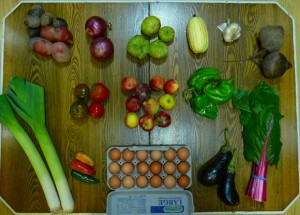 After a long day, it’s easy to order takeout, nuke a freezer meal in the microwave or “cook” up a box of hamburger helper. The clean-up for these meals is also easier. Takeout meals have disposable utensils, napkins, containers and condiment packages. Very little cleanup is required for freezer meals or boxed meals as well. While this food is easy to make, however, it is food that has been changed-processed and complicated-in order to be able to freeze well, taste good or be cheap to mass produce. Complicated food is not intended to nourish, primarily, but to be sold. It is a commodity; and, for the most part, it is a food substitute.
After a long day, it’s easy to order takeout, nuke a freezer meal in the microwave or “cook” up a box of hamburger helper. The clean-up for these meals is also easier. Takeout meals have disposable utensils, napkins, containers and condiment packages. Very little cleanup is required for freezer meals or boxed meals as well. While this food is easy to make, however, it is food that has been changed-processed and complicated-in order to be able to freeze well, taste good or be cheap to mass produce. Complicated food is not intended to nourish, primarily, but to be sold. It is a commodity; and, for the most part, it is a food substitute.
We romanticize certain kinds of foods, foods that are homemade, heirloom, specialty, craftsman, or gourmet. We intrinsically recognize that non-industrialized foods hold great value and character. Even industrialized foods try to hearken back to simpler times, when food was grown primarily on small farms and livestock were able to roam under the sun and rain. We want simple food, but simple food is hard to come by.
To eat real food, and to eat it as simply as possible, you have to buy raw ingredients. You have to prepare them. You have to wash tons of dishes. And tomorrow you have to do it all over again.
How would you make your own salsa? How would you can or preserve your summer tomatoes? How would you bake your own bread or grind your own flour? Can you imagine making your own yogurt, or even your own cheese? Have you ever considered raising backyard chickens?
 The more “simply” you eat and the raw-er your ingredients get, the more time you spend preparing them, and the more dishes you have to wash. When a meal is simple and your ingredients are simple, there is often much work, preparation or training involved. It’s a pity, really, that we have lost a lot of our innate cultural wisdom regarding food preparation. To our grandmothers and great-grandmothers, much of this simple living came naturally as they learned the traditions from their mothers; for those raised in an industrialized world where our mothers were raised to depend on supermarkets and Betty Crocker, we have to strive to find a food niche from which to nourish our families.
The more “simply” you eat and the raw-er your ingredients get, the more time you spend preparing them, and the more dishes you have to wash. When a meal is simple and your ingredients are simple, there is often much work, preparation or training involved. It’s a pity, really, that we have lost a lot of our innate cultural wisdom regarding food preparation. To our grandmothers and great-grandmothers, much of this simple living came naturally as they learned the traditions from their mothers; for those raised in an industrialized world where our mothers were raised to depend on supermarkets and Betty Crocker, we have to strive to find a food niche from which to nourish our families.
I’m thankful that farmers markets are on the rise. I’m thankful that people are demanding local food options. I’m thankful that meat shops across the nation are offering butchery workshops for average citizens. I’m thankful heirloom seeds were preserved by a handful of wonderfully weird and independent farmers and gardeners. I’m thankful that the internet is available to be a great resource for those of us who want to walk away from over processed fake foods and be retrained in the wonderfully deep and mysterious world of real, simple food.
I’ve learned a lot, and I still have a lot more to explore. In the meantime, who wants to come wash my dishes?
By ekwetzel
2010-10-22
*Photos of the takeout bags and of the girl in the kitchen, courtesy of Molly Morris.
(Clockwise, from the eggs)
Eggs (again, the farm has young hens, and they are laying smaller eggs this week, so we received 18 eggs instead of the normal dozen)
3 Jalapeno Peppers
2 Leeks
Red & Purple Potatoes
2 Purple Onions
4 Tomatillos
Delicata Squash
Garlic
2 Beets
Red Chard
2 Eggplant
(In the middle)
4 Tomatoes
Apples
3 Green Peppers


Stephen asks me frequently, “Why don’t people make their own (fill in the blank)”? I tell him it’s because it takes time, effort, knowledge (or at least the willingness to follow a recipe or instructions), and you’ve got to have the “want-to” attitude. People may need to invest in a few different kitchen tools. They may have to re-organize their day to make time to be in the kitchen for 30 minutes or more. But the pay-off is fantastic! I am often amazed at the time it takes to chop, slice, & measure a meal into my crock-pot. But when it’s dinner-time, I wouldn’t have it any other way.